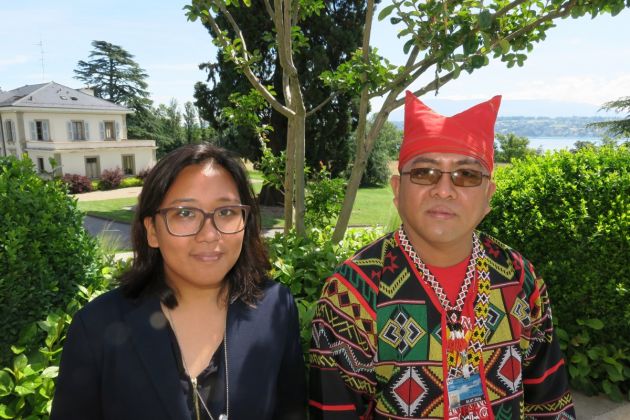Philippines' Ba'laan leader testifies for world churches at UN Human Rights Council

Kerlan Fanagel's submission at the Human Rights Council came on its 10th anniversary highlighting the plight of the Lumad in Mindanao, in the southern Philippines, a grouping of people who have been displaced from their traditional lands.
Lumad is the collective term for indigenous people in Mindanao in the southern part of the Philippines) displaced from Talaingod and Kapalong in Davao del Norte, in Mindanao and who have seen international mining companies snatch their land and resources.
Their water is also slipping through their control in a privatizing environment as corporations also seek to exploit local palm oil and trees for logging.
Fanagel spoke on 20 June on behalf of the Commission of the Churches on International Affairs of the World Council of Churches that sees the restoration of justice for the indigenous Ba'laan people of Mindanao as one of the council's priorities.
"As indigenous people, our homes are important to us because of our cultural ties to the land and because this is where our farms and livelihoods are. However, while some people have been able to return home, others are still afraid," said the Filipino indigenous leader.
At the same HRC session, Johanna May Dela Cruz of the National Council of Churches in the Philippines related how on 1 April security forces "brutally dispersed" a peaceful demonstration by some 6,000 farmers and indigenous people on the main highway in Kidapawan.
They were demanding rice and the release of calamity funds to avert the debilitating effects of a drought induced by the El Niño phenomenon.
'FARMERS MET BY GUNFIRE'
"Their demands were well within the government's capacity to respond to but the farmers were met by gunfire, hot pursuit and illegal arrests," said Dela Cruz..
In an interview before testifying to the U.N. rights' body, in which the WCC and other ecumenical bodies engaged through NGO's, Fanagel explained how his people have been displaced from Talaingod and Kapalong in Davao del Norte, in Mindanao.
"We were forced to flee our communities because of the increasing militarization, the occupation and closure of our schools by elements of the armed forces of the Philippines, the extra-judicial killing of some of our people by agents of the state, and other forms of harassment.
"We fled to the Haran Mission Compound of the United Church of Christ in the Philippines, where we were provided with support and protection," he said in his testimony for the HRC in Geneva, saying his group works with the NCCP.
Clad in his red traditional headscarf and shirt, he rued, "However the military and para-military groups have continued to harass us even in this sanctuary," speaking on the HRC hearing on internally displaced people.
He said that government representatives especially congresswoman Nancy A. Catamco directed the Philippine National Police to raid their place of refuge.
"The military and police have brought trumped up charges of kidnapping and human trafficking against people who have been trying to help us.
"They claim that the people were being held in the Haran Mission Centre against their will. This has never been the case. We sought refuge there, have been supported by the church and others in this place of refuge, and have been too afraid to return to our homes," said Fanagel.
He explained that recently the Philippine Ombudsman dismissed a "trumped up case as being without grounds".
This people have also appealed to the Philippine Commission on Human Rights about their experience.
"We call on the armed forces of the Philippines to leave our communities, to stop the harassment against us, and to respect our right to live in peace.
"The military is using para-military groups to harass our people and to commit human rights violations from which the military can distance themselves from direct involvement," said Fanagel.
He called for the disbanding of the para-military groups and that military support no longer be provided to them, "so that we can pursue our lives in peace without fear."